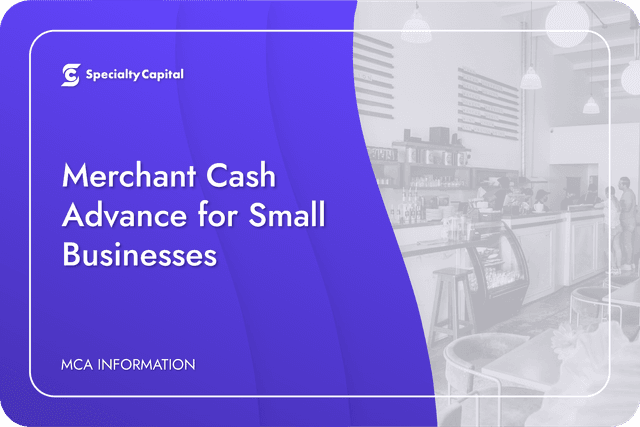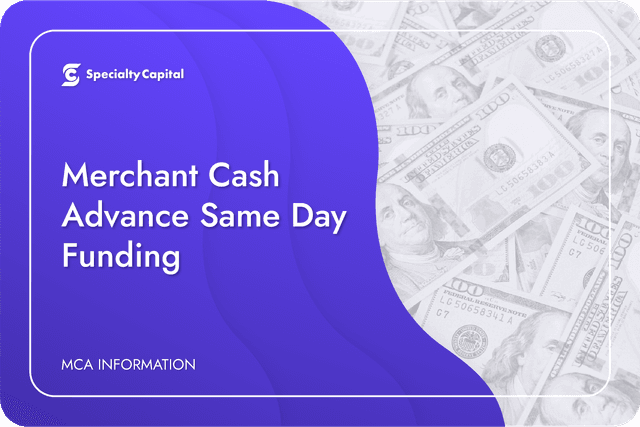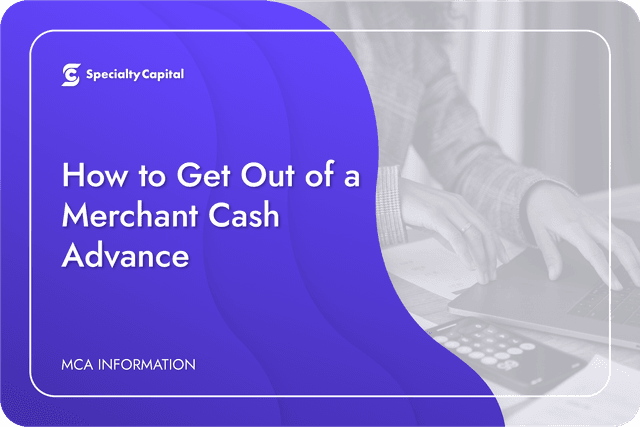When it comes to financing for your business, there’s no shortage of options at your disposal. Between business loans, factoring, and merchant cash advances – navigating your options can be a challenge. In this guide, we’ll explore exactly what a merchant cash advance is, how it works, and some of the pros and cons you’ll want to consider with this type of financing.
In simplest terms, a merchant cash advance – also known as an MCA, is a type of business financing that utilizes card sales as collateral in exchange for a lump sum amount of financing. The business agrees to remit back the principal amount (with a fee) without the hassle and restrictions that traditional business loans carry.
With an MCA, you’ll remit your financing by deducting a predetermined percentage of your weekly (or daily) debit and credit card sales until your lump sum is paid in full.
If you’re a small business and need funding to grow your business – taking advantage of a merchant cash advance can be a great option to get the cash you need. Here’s how it works.
First, you’ll need to provide the merchant cash advance company with your business history and monthly card sales. Each company may have slightly different requirements, but each of them will want to get a good understanding of how much money your business is generating each month through card sales. Oftentimes, you’ll need to provide 12 to 24 months of history so they can analyze any slower months of the year.
Next, the MCA company will determine a factor rate based on their assessment of your business and its stability. These can vary depending on a multitude of factors but typically lie between 1.1 and 1.5. Additionally, the MCA company will also determine the percentage of card sales
If you agree to the factor rate and terms of the financing, the MCA company will disperse your lump sum so you can grow your business.
As sales are generated, the MCA company will then take a certain percentage of your weekly (or sometimes daily) sales until your lump sum and fees are paid in full.
Here’s exactly how a merchant cash advance could work.
Let’s assume you operate a retail store and need cash to restock vital inventory for your business before the holiday months. In this scenario, we’ll assume you have monthly card sales of $100,000 and you are seeking $70,000 in financing to fund your next inventory purchase.
After submitting your financing needs, an MCA company may determine a factor rate of 1.25 for your business. This means that the total cost of your financing would amount to $87,500. Depending on the structure of your financing, this could mean that you remit weekly (or daily) installments on your financing. In this scenario, we’ll assume weekly remittance of 10% of your weekly card sales. This means that each week, you’ll remit $2,500 towards your financing until the total ($87,500) amount is paid in full. Using these figures, it would take your business an estimated 35 weeks to remit the full amount.
It’s worth noting that the amount you will remit each week will depend on your card sales. For months with lower card sales, you may remit less. For months with elevated card sales, you might remit more.
If you need help determining the cost of a MCA, you can use a merchant cash advance calculator to get a better idea of your costs.
The fees of an MCA are determined by the factor rate that your MCA company offers. These fees will vary depending on several factors including your business history, financials, credit, and more but in many cases will be between 1.1 and 1.5. For example, if you plan to borrow $100,000 with a factor rate of 1.5, the total remittance amount would equal $150,000.
Additionally, there may be underwriting and administrative fees depending on the company you work with, so be sure to understand the total amount of your financing before committing to any contract.
There are several advantages to choosing a merchant cash advance for your business.
However, with every type of business financing, there are some disadvantages to be aware of.
There are several merchant cash advance alternatives you can examine if an MCA doesn’t quite suit your needs.
A traditional business loan can be a more straightforward business financing option if you need funding and have collateral to back your loan. There are a variety of business loans that can offer a lump sum of cash for your business depending on a variety of factors. All of these considerations will apply to a conventional business loan:
Overall, a traditional business loan can occasionally offer more competitive rates than a merchant cash advance, but the requirements are much more strict and regulated.
SBA (Small Business Association) loans can be worthwhile if you have poor credit, or need more lenient qualifications than a traditional business loan. Thanks to their partial government-subsidized offerings, they offer competitive interest rates and can be funded extremely fast in some cases. There are several types of SBA loans depending on your circumstances including:
However, SBA loans require a personal guarantee, a down payment, and are highly regulated, requiring an extensive application and funding process that might drive some borrowers away.
SBA loans can be a great option for small businesses with weak credit and that require more lenient requirements. They often don’t have revenue requirements and your financing can be used for a variety of costs.
Each type of loan has unique qualifications and requirements, so it’s important to do some research before applying.
Invoice factoring is very similar to a merchant cash advance with the main difference being that instead of using card sales as collateral, outstanding invoices are used. Just like with an MCA, a factor rate is added to your financing that will determine the cost of your financing. The factoring company will determine this based on a multitude of factors including the credit and trustworthiness of the business customers, payment terms with customers, the history of the business, and more.
If your business has outstanding invoices and you need cash, invoice factoring can be a viable option to get funding quickly.
If you’re looking to purchase equipment, equipment financing can be another option to get funding for your business. This type of financing is tailored specifically for equipment purchases and is self-collateralizing so you don’t need additional collateral to get approved. Similar to other loan requirements, the financing company will analyze your business and personal credit scores, business plans and history, as well as your business financials. In most cases, a down payment is required for equipment financing so it might not work for every business. However, this can be a more affordable option if your business is using the financing for new equipment.
If you need a revolving line of credit that’s straightforward, opting for a business line of credit can be another option worth exploring. Business lines of credit work similarly to a business credit card. The credit company will approve your business for a specific amount, known as the “line”, which you are able to draw from for a certain time limit. As you repay your draw, you increase the amount available until you reach the full line of credit amount.
Business lines of credit can be great for businesses that need flexible financing options. While the interest rates can be more than a traditional business loan, they grant more flexibility with your funding.
If your business needs financing quickly, one of the easiest options is opting for a business credit card. While this method does offer you access to a large amount of financing, it’s worth noting that you cannot easily secure cash. So depending on your needs and expenses, this method may not be suitable for your business. Additionally, interest rates on business credit cards can be higher than other forms of financing, so it’s worth exploring all of your options before submitting your application.
If you’re seeking financing for your business, choosing a merchant cash advance can be an easier method to get the funds you need. Because of the more lenient qualifications, opting for a MCA can be more costly than other forms of financing, but thanks to prepayment discounts, in some occasions, they can be more affordable. It’s critical to always do your research before deciding which financing method is best for your business.
Overall, if you operate an established business with routine card sales, choosing a merchant cash advance can be a viable option to get the funds you need to grow your business.
If you’re ready to get started, get in touch with us today to explore your options!

Merchant Cash Advance for Small Businesses (Benefits & Requirements)
When small businesses need financing, they have a range of financing options to choose from. But many opt for a merchant cash advance (MCA) because...

Merchant Cash Advance Same Day Funding
A merchant cash advance (MCA) is a great financing option when you need same-day funding, but there are certain requirements, restrictions, and dra...

How to Get out of a Merchant Cash Advance
A merchant cash advance (MCA) can be great when you need short-term financing that’s easy to secure, but what happens if you want to get out of an ...